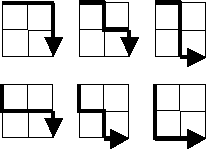Project Euler’s problem #11 statement goes:
In the 20×20 grid below, four numbers along a diagonal line have been marked in red.
08 02 22 97 38 15 00 40 00 75 04 05 07 78 52 12 50 77 91 08
49 49 99 40 17 81 18 57 60 87 17 40 98 43 69 48 04 56 62 00
81 49 31 73 55 79 14 29 93 71 40 67 53 88 30 03 49 13 36 65
52 70 95 23 04 60 11 42 69 24 68 56 01 32 56 71 37 02 36 91
22 31 16 71 51 67 63 89 41 92 36 54 22 40 40 28 66 33 13 80
24 47 32 60 99 03 45 02 44 75 33 53 78 36 84 20 35 17 12 50
32 98 81 28 64 23 67 10 26 38 40 67 59 54 70 66 18 38 64 70
67 26 20 68 02 62 12 20 95 63 94 39 63 08 40 91 66 49 94 21
24 55 58 05 66 73 99 26 97 17 78 78 96 83 14 88 34 89 63 72
21 36 23 09 75 00 76 44 20 45 35 14 00 61 33 97 34 31 33 95
78 17 53 28 22 75 31 67 15 94 03 80 04 62 16 14 09 53 56 92
16 39 05 42 96 35 31 47 55 58 88 24 00 17 54 24 36 29 85 57
86 56 00 48 35 71 89 07 05 44 44 37 44 60 21 58 51 54 17 58
19 80 81 68 05 94 47 69 28 73 92 13 86 52 17 77 04 89 55 40
04 52 08 83 97 35 99 16 07 97 57 32 16 26 26 79 33 27 98 66
88 36 68 87 57 62 20 72 03 46 33 67 46 55 12 32 63 93 53 69
04 42 16 73 38 25 39 11 24 94 72 18 08 46 29 32 40 62 76 36
20 69 36 41 72 30 23 88 34 62 99 69 82 67 59 85 74 04 36 16
20 73 35 29 78 31 90 01 74 31 49 71 48 86 81 16 23 57 05 54
01 70 54 71 83 51 54 69 16 92 33 48 61 43 52 01 89 19 67 48
The product of these numbers is [pmath]26 * 63 * 78 * 14 = 1788696[/pmath].
What is the greatest product of four adjacent numbers in any direction (up, down, left, right, or diagonally) in the 20×20 grid?
This one is remarkably easy but also was quite fun. I think it’s because it reminds me of the kind of work we’d do during our Algorithms classes during my first year in college. And so this one goes to my Algorithms teacher, Ricardo Vargas Dornelles—best teacher I’ve ever had too.
import operator
numbers = [[8,2,22,97,38,15,0,40,0,75,4,5,7,78,52,12,50,77,91,8],
[49,49,99,40,17,81,18,57,60,87,17,40,98,43,69,48,4,56,62,0],
[81,49,31,73,55,79,14,29,93,71,40,67,53,88,30,3,49,13,36,65],
[52,70,95,23,4,60,11,42,69,24,68,56,1,32,56,71,37,2,36,91],
[22,31,16,71,51,67,63,89,41,92,36,54,22,40,40,28,66,33,13,80],
[24,47,32,60,99,3,45,2,44,75,33,53,78,36,84,20,35,17,12,50],
[32,98,81,28,64,23,67,10,26,38,40,67,59,54,70,66,18,38,64,70],
[67,26,20,68,2,62,12,20,95,63,94,39,63,8,40,91,66,49,94,21],
[24,55,58,5,66,73,99,26,97,17,78,78,96,83,14,88,34,89,63,72],
[21,36,23,9,75,0,76,44,20,45,35,14,0,61,33,97,34,31,33,95],
[78,17,53,28,22,75,31,67,15,94,3,80,4,62,16,14,9,53,56,92],
[16,39,5,42,96,35,31,47,55,58,88,24,0,17,54,24,36,29,85,57],
[86,56,0,48,35,71,89,7,5,44,44,37,44,60,21,58,51,54,17,58],
[19,80,81,68,5,94,47,69,28,73,92,13,86,52,17,77,4,89,55,40],
[4,52,8,83,97,35,99,16,7,97,57,32,16,26,26,79,33,27,98,66],
[88,36,68,87,57,62,20,72,3,46,33,67,46,55,12,32,63,93,53,69],
[4,42,16,73,38,25,39,11,24,94,72,18,8,46,29,32,40,62,76,36],
[20,69,36,41,72,30,23,88,34,62,99,69,82,67,59,85,74,4,36,16],
[20,73,35,29,78,31,90,1,74,31,49,71,48,86,81,16,23,57,5,54],
[1,70,54,71,83,51,54,69,16,92,33,48,61,43,52,1,89,19,67,48]]
maxp = 0
for row in range(0,16):
for col in range(0,16):
maxp = max(maxp, reduce(lambda x,y: x*y,
[n for n in numbers[row][col:col+4]]))
maxp = max(maxp, numbers[row][col] * numbers[row + 1][col + 1] *
numbers[row+2][col+2] * numbers[row+3][col+3])
maxp = max(maxp, reduce(lambda x,y: x*y,
[n[col] for n in numbers[row:row+4]]))
if col > 3:
maxp = max(maxp, numbers[row][col] *
numbers[row + 1][col - 1] *
numbers[row+2][col-2] *
numbers[row+3][col-3])
print maxp
As well, this runs in 0.020s, so not bad at all.



 and read about primes. Honestly, I’ve been reading more about primes lately than I even thought I would.
and read about primes. Honestly, I’ve been reading more about primes lately than I even thought I would.